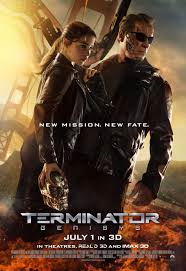Alan Taylor’s reboot of the Terminator franchise at least proves entertaining on a base level, even if its reverential humour – with inevitable shots at the effects of aging – is as endearingly clunky as some of the overheated action scenes. These regular bursts are spread over various time zones as the characters race to find a solution to Skynet’s hunger for world domination. The film begins in the distant future with John Connor (Jason Clarke), the war hero leading his men, including right hand man Kyle Reese (Jai Courtney), to victory over the machines and seemingly Skynet. However, just as Reese is being blasted back to 1984 to oversee the protection of Connor’s mother Sarah (Emilia Clarke), a residual, more organic incarnation of Skynet claims Connor, leaving his fate up in the air.
Circumstances have changed back in 1984 too, with Sarah no longer blissfully going about her life as a waitress in her days before a Terminator arrives to execute her. Instead Reese finds himself becoming the rescued. Sarah, it seems, has been raised by the cyborg she’s named Pops (Arnold Schwarzenegger) since the age of 9 and in the interim has been waiting for Reese’s arrival. This sleek deviation from the scene of James Cameron’s original classic in 1984 kick-starts the plot as the trio fends off the inevitable shape-shifting, liquefying Terminator (Byung-hun Lee) and head to 2017 to prevent the original start date of Skynet’s global infection via a new computer operating system that links all humanity to its technological doom.
Naturally, Terminator: Genisys (2015), plays heavily on the franchise’s earlier instalments, with Schwarzenegger’s participation a large part of the deal. He turns back the clock in a sense, though the nostalgic glow he casts over the production via his wry one-liners and indestructible presence is certainly tainted by a certain predictability, and a screenplay – by Patrick Lussier and Laeta Kalogridis – that struggles to keep up, logically, with its own obtuse back and forwards jack-knifing through time. Taylor’s direction is rudimentary in every way whilst the clucky special effects, especially in some of the earlier set-pieces, seem ‘off’. There often feels like a less than smooth transition between the CGI and the actors’ reactions to them.
Courtney and Emilia Clarke – making an inexorable transition from epic-scaled small screen drama – are solid contributors in a film that only meekly pays lip service to creating fresher angles on these long-established characterisations. And neither comes close to capturing the raw intensity of the originals, Linda Hamilton and Michael Biehn. The most impressive cast member is easily Courtney’s fellow Australian Jason Clarke who builds upon the momentum from Dawn of the Planet of the Apes (2014) and Zero Dark Thirty (2012) which a performance that shows off his genuine presence. Special mention as well must go to the brilliant J.K. Simmons for his tragically minor role as a beleaguered but clued-in cop who can’t get anyone to take him seriously.
This fifth chapter outweighs the Arnie-less fourth, which wouldn’t have been much of a stretch. There’s a not invaluable lesson about the harmful long-term effects of humanity’s ultimate reliance upon and meek subservience to the rapidly expanding technologies at our disposal, and in providing heightened, increasingly ludicrous action sequences it at least fits the bill for lightweight entertainment. The Hans Zimmer influence, as ever, is obvious in composer Lorne Balfe’s writing, though it does pound along with a suitably syncopated relentlessness and offers plenty of nods to original composer Brad Fiedel’s throbbing electronic motif. The work provided by the previous two musical contributors to the franchise, Marco Beltrami and, more recently, Danny Elfman, were far more varied and substantial. Overall, a pleasingly over-the-top return to comfortingly familiar waters that’s as disposable as it is enjoyable.

